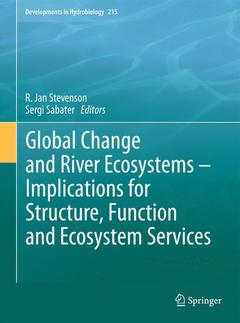Description
Global Change and River Ecosystems - Implications for Structure, Function and Ecosystem Services, 2010
Developments in Hydrobiology Series, Vol. 215
Coordinators: Stevenson R. Jan, Sabater Sergi
Language: English
Publication date: 01-2013
278 p. · 19.3x26 cm · Paperback
Publication date: 11-2010
278 p. · 19.3x26 cm · Hardback
Description
/li>Contents
/li>Comment
/li>
Rivers around the world are threatened by changes in land use, climate, hydrologic cycles, and biodiversity. Global changes in rivers include, but are not restricted to water flow interruptions, temperature increases, loss of hydrological connectivity, altered water residence times, changes in nutrient loads, increasing arrival of new chemicals, simplification of the physical structure of the systems, occurrence of invasive species, and biodiversity losses. All of them affect the structure and functioning of the river ecosystem, and thereby, their ecosystem services. Understanding the responses of river ecosystems and their services to global change is essential for protecting human well being in all corners of the planet. Rivers provide critical benefits by providing food from fisheries and irrigation, regulating biogeochemical balances, and enriching our aesthetic and cultural experience.
Predicting responses of rivers to global change is challenged by the complexity of interactions among these man-made drivers across a mosaic of natural hydrogeomorphic and climatic settings. This book explores the broad range of determinants defining global change and their effects on river ecosystems. Authors have provided thoughtful and insightful treatments of specific topics that relate to the broader theme of global change regulation of river ecosystems.




